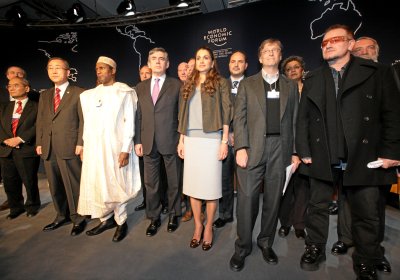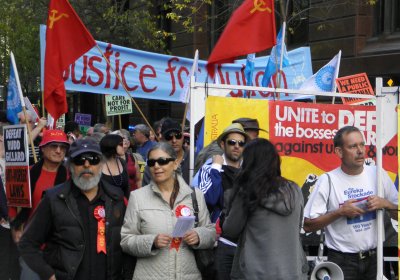Twelve years ago, with the support of the United Nations, world leaders agreed to work together to achieve universal education, promote gender equality and halve extreme poverty by 2015.
Known as the Millennium Development Goals (MDGs), the initiative has been described as the “most successful global anti-poverty push in history”.
But how much have the goals really achieved? Five years after they were adopted, their achievements were discussed at the World Social Forum held in Brazil in 2005.
Analysis
A picture of a 1938 Daily Mail article titled "German Jews pouring into this country”, circulated social media networks last week and drew comparison with Australia's “stop the boats” obsession.
“The number of Jewish aliens entering this country through the 'back door'” was “an outrage” and “a problem to which The Daily Mail has repeatedly pointed,” the article said.
The Northern Territory women’s policy minister, Alison Anderson, told a gathering at the Wheeler Centre in Melbourne that “domestic violence has reached a crisis point”, the ABC reported on April 4.
The ongoing strike at Sydney University attracted national media attention on March 26 when strike-supporting students were dragged from a lecture theatre by riot police.
The students were engaged in a “roaming picket” that was disrupting one of the few remaining classes held that day when police intervened. This sparked debate as to whether student supporters used appropriate tactics to make their presence heard.
For anyone who knows the science, it’s settled — fossil fuels need to be banished fast from our energy mix. But how do we achieve it? Can we rely on renewable sources such as wind and solar? Or must humanity turn to nuclear power?
That’s a controversy that has bubbled away for years among people who all accept the dangers of global warming. Now, from the energy sector in China, there’s hard new evidence bearing on this debate.
The experience in China shows that as a way of quickly replacing greenhouse-polluting fuels, renewable energy wins against nuclear, hands down.
The National Tertiary Education Union (NTEU) at the University of Sydney is involved in an industrial battle with the administration over pay, conditions and casualisation.
As part of this campaign, the union held a 24-hour strike on March 6. Staff and students held pickets outside all campus entrances, and the university was largely shut down for the day.
The multiple picket lines converged on the main entrance to the university for a midday rally, which attracted hundreds of staff and supporters. There were many speakers including unionists, student representatives and the Greens.
The abortive leadership spill in the Labor party on March 22 was yet another demonstration of its total political bankruptcy.
Kevin Rudd's leadership ambitions may now be in the dustbin of history but Prime Minister Julia Gillard has won a pyrrhic victory.
The public watched this gross display of principle-free power play in disgust. It seemed to make a government led by Liberal leader Tony Abbott a virtual certainty.
Do oil spills make good economic sense? A witness called by Canadian firm Enbridge Inc— which wants approval to build a $6.5 billion pipeline linking Alberta’s tar sands with the Pacific coast — told a recent hearing in British Columbia that the answer is yes.
A landmark ruling in Sydney on February 15 gave the biotechnology industry an unprecedented right to make huge profits from genetic testing.
The case involved the breast cancer genes BRCA 1 and BRCA 2 and the right of US biotechnology company Myriad Genetics to have exclusive licence to a patent over their use in research.
Federal Court Justice John Nicholas had ruled that a private company can continue to hold a patent over an isolated gene, in this case, the BRCA gene. The BRCA gene is responsible for repairing or removing defective DNA cells.
Northern Territory Chief Minister Terry Mills was replaced by Adam Giles in a sudden leadership coup on March 13, while Mills was in Japan on a trade mission. This shift has led to backdowns from the Country Liberal Party (CLP) on some regressive policies but could pave the way for more attacks in the future.
Crikey’s Bob Gosford predicted the spill on March 5 and wrote a detailed account of it.
When coal seam gas company Metgasco announced on March 13 it had suspended its operations in northern NSW after a long community campaign against it, it was just the latest in a series of setbacks for the CSG industry.
It followed the suspension of an AGL project in Campbelltown in western Sydney after community protests. Another company, Arrow Energy, has withdrawn from NSW and wants to transfer its licence to Dart Energy so it can focus on expanding in central Queensland.
Having tried absolutely everything they could think of to win the support of voters besides push good polices in favour of working people, there was really nothing for Labor's parliamentary caucus to do except launch yet another leadership spill on March 21.
It might have been a farce that will help worsen Labor's defeat in September, but it did reveal one startling fact: Simon Crean is still in parliament. I know, right?
- Previous page
- Page 378
- Next page











